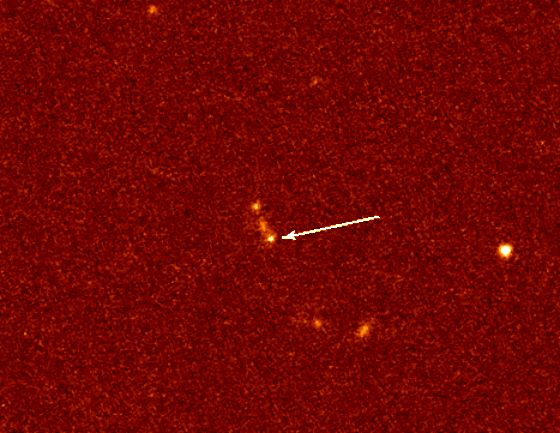 |
Астронет: Астрономическая картинка дня Послесвечение гамма-всплеска: связь со сверхновой http://www.astronet.ru/db/msg/1175664/eng |
Credit & Copyright: HST Image: D.W. Fox, J.S. Bloom, S.R. Kulkarni
(Caltech), et al.
XMM Result: J.N. Reeves, D. Watson, J.P. Osborne (University of Leicester), et al.
Explanation:
What causes the mysterious
gamma-ray bursts?
Indicated in this
Hubble Space Telescope exposure of an otherwise
unremarkable field in the constellation
Crater, is the dwindling
optical afterglow of a gamma-ray burst first
detected
by the Beppo-SAX satellite on 2001 December 11.
The burst's host galaxy,
billions of light-years distant, is the
faint smudge extending above and to the left of the afterglow position.
After rapidly catching the
fading
x-ray light from the burst with
the orbiting XMM-Newton
observatory, astronomers are
now reporting
the telltale signatures of
elements
magnesium, silicon,
sulphur, argon, and calcium - material most likely found in an
expanding debris
cloud produced by the explosion of a massive star.
The exciting result
is evidence that the gamma-ray burst itself
is linked to a very energetic supernova
explosion
which may have
preceded the powerful
flash of gamma-rays by up to a few days.
XMM Result: J.N. Reeves, D. Watson, J.P. Osborne (University of Leicester), et al.
Authors & editors:
Robert Nemiroff
(MTU) &
Jerry Bonnell
(USRA)
NASA Web Site Statements, Warnings,
and Disclaimers
NASA Official: Jay Norris.
Specific
rights apply.
A service of:
LHEA at
NASA /
GSFC
& Michigan Tech. U.
